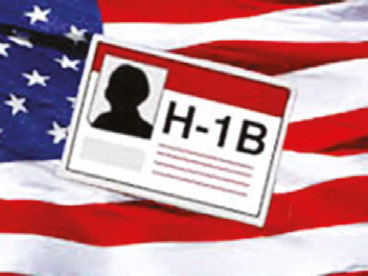
Starting April 3, 2017, U.S. Citizenship and Immigration Services will temporarily suspend premium processing for all H-1B petitions, a statement issued by the USCIS stated. This suspension may last up to 6 months. While H-1B premium processing is suspended, petitioners will not be able to file Form I-907, Request for Premium Processing Service for a Form I-129, Petition for a Non-immigrant Worker which requests the H-1B nonimmigrant classification. We will notify the public before resuming premium processing for H-1B petitions.
The premium processing service allows an applicant or his potential employer to pay $1,225 to receive a response to his petition within 15 days. If USCIS has not responded within 15 days, the fee is refunded, though the application still receives expedited processing, according to a bulletin issued by the agency March 3. H-1B visas are used by U.S. employers to temporarily employ foreign workers, most often from India, in specialty occupations.
“This temporary suspension will help us to reduce overall H-1B processing times. By temporarily suspending premium processing, we will be able to process long-pending petitions, which we have currently been unable to process due to the high volume of incoming petitions and the significant surge in premium processing requests over the past few years; and prioritize adjudication of H-1B extension of status cases that are nearing the 240 day mark,” said the agency in a bulletin.
USCIS has said the temporary suspension of premium processing could last as long as six months. The agency has said it will reject any form I-907 – request for premium processing – filed with an H-1B petition. If a check is issued to cover both applications, USCIS noted it will have to reject the H-1B application as well.
“Since FY18 cap-subject H-1B petitions cannot be filed before April 3, this suspension will apply to all petitions filed for the FY18 H-1B regular cap and master’s advanced degree cap exemption (the ‘master’s cap’),” noted USCIS, adding that the suspension also applies to petitions that may be cap-exempt.
H-1B petitioners can still expedite their applications if they meet one of the following criteria: a severe financial loss to company or person; an emergency situation; humanitarian reasons; a non-profit organization whose work benefits the cultural and social interests of the U.S., certain Defense Department situations; or USCIS errors. Such requests will be reviewed on a case-by-case basis. The temporary suspension does not apply to other non-immigrant classifications. The United States Citizenship and Immigration Services has ruled that Green Card holders and visa holders, like those on H-1B, L-1, J or F-1, H4 visa, and even those having an Employment Authorization Card (EAD) must carry legal documents papers when traveling in and out of the country and at all times within the United States, or face the risk of being fined or imprisoned, or even both.
With a large-scale immigration crack-down on undocumented foreigners imminent after President Donald Trump’s new executive orders, it’s important for all documented residents in the US to keep proof of their legal status in the country.
And for those in the pipeline for a Green Card, a misdemeanor charge could have terrible repercussions when it comes to being adjudicated for legal permanent resident status. The same applies for Green Card holders who wish to become US citizen.
The United States Citizenship and Immigration Services rule states: ‘Every alien, eighteen years of age and over, shall at all times carry with him and have in his personal possession any certificate of alien registration or alien registration receipt card issued to him pursuant to subsection (d). Any alien who fails to comply with the provisions of this subsection shall be guilty of a misdemeanor and shall upon conviction for each offense be fined not to exceed $100 or be imprisoned not more than thirty days, or both.’
Another sub-section of the rule says: ‘Notwithstanding any other provision of law, the Attorney General is authorized to require any alien to provide the alien’s social security account number for purposes of inclusion in any record of the alien maintained by the Attorney General or the Service.’





Be the first to comment